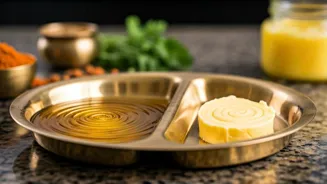In the vibrant world of Indian cuisine, ghee and butter reign supreme! But which is better for your health? Let's settle the ghee vs. butter debate, uncovering the nutritional facts and cultural nuances.
Ghee's Glorious History
Ghee, with its roots deep in Indian tradition, is more than just a cooking fat; it's a symbol of purity and good health. It's a staple in Ayurvedic practices, believed to aid digestion and boost immunity. Learn why ghee holds a special place in Indian kitchens and religious ceremonies alike. This history makes it a must-have in every Indian household.
Butter's Buttery Allure
Butter, the creamy cousin, offers its own charm, beloved for its taste and versatility. While it may not have the same spiritual depth, butter brings a unique flavor to dishes. It's a key ingredient in many Indian sweets and Western-inspired recipes. But what are the health implications of butter?
Nutritional Face-Off
Ghee is clarified butter, so it offers a higher smoke point and is lactose-free. Butter contains lactose, though it is present in only small amounts. Both are rich in fats, but ghee often wins for its concentration of fat-soluble vitamins and Ayurvedic benefits. The choice depends on dietary needs.
Daily Dietary Dilemma
For adults, the daily choice depends on your overall diet and health goals. Ghee is generally considered easier to digest. Consider your lifestyle and cooking preferences when making the choice. A small amount of either can be part of a healthy diet. Remember, moderation is key in either case!
Indian Kitchen Crossroads
In Indian cooking, ghee often shines, adding depth and flavor. Consider using ghee for frying and butter for dishes where its flavor is key. Both have a place, allowing you to enjoy the best of both worlds. Embrace the versatility and find what complements your taste and dietary needs.












